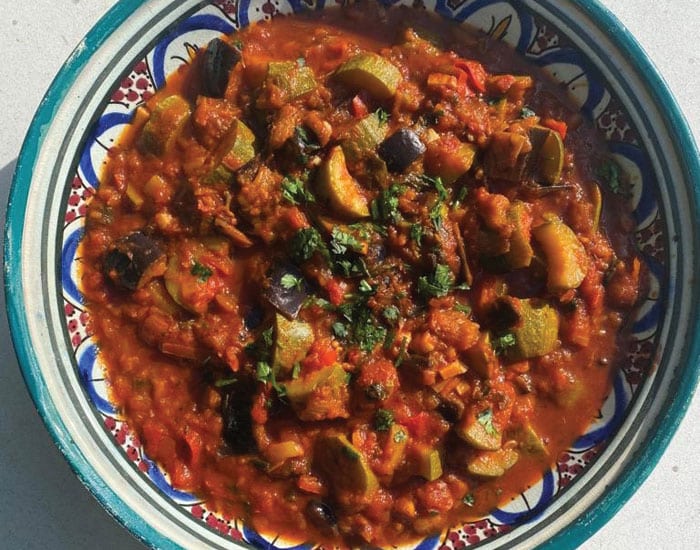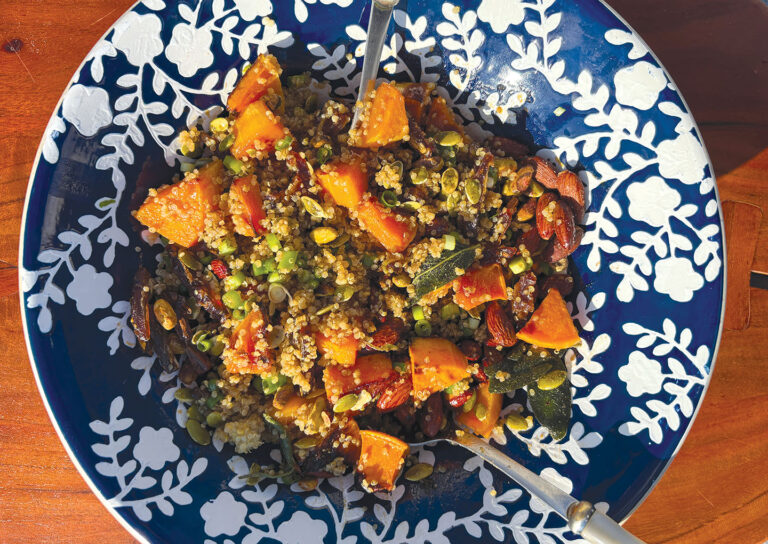An Aroma From Aleppo — Hamud Soup

The history of the Aleppo Jews is long and fascinating, dating back to the time of the Second Temple period. The Hebrew name for Aleppo, Chalab, is derived from the legend that Abraham grazed his sheep on the verdant mountain of Aleppo and gave the milk (chalav) to the poor people living on its slopes.
For generations, the community was centered around the Great Synagogue of Aleppo, with the ancient section built in the Byzantine style with three stoae, covered walkways with open rows of Greek columns. There was a large central courtyard in the center with a raised tevah (readers platform). The western wing was used for worship by the musta’arabi (Arabic speaking) community and the eastern wing, built in the 16th century, was utilized as a Beit Midrash and prayer hall by the “Francos” the Sephardic Jews that settled in Aleppo after the Spanish Expulsion.
(For centuries, the legendary Aleppo Codex was housed in a nook called the Cave of Elijah. This year, the Israel Museum launched a virtual reality exhibit of the Great Synagogue, produced from 51 photos taken by an Armenian photographer commissioned by Sarah Shammah in November 1947. Days later, the United Nations voted for the Partition of the British Mandate of Palestine. An angry mob rioted and set fire to much of the Synagogue.)
Beginning in the mid 19th century to the early 20th century, amid the disintegration of the Ottoman Empire and the opening of the Suez Canal in 1869, removed Aleppo from its importance in the trade routes with the Far East, many members of the Aleppo community began to leave Syria. Some moved to Jerusalem and Egypt. Others moved to Brooklyn, Mexico City, Panama and Latin America.
Renowned for their piety and their skill as traders and businessmen, the Syrian Jews established tight knit communities. The grandmother of our good friend Esther Kassin Avrahamy, Esther Sutton Kassin was born in 1915 on the fabled Delancey Street on the Lower East Side of Manhattan
. Her parents hailed from Aleppo and her father was a merchant who traded in linens. He moved his young family to Haiti, where he opened a linen emporium.
She returned to New York and married Ezra Kassin in 1936. Together, they raised ten children and Esther’s father Bobby was her fifth child.
Esther recalls that her grandmother always made Kibbeh Hamdah, Syrian meatballs in a lemon-mint broth for Friday night dinner, popularly referred to as Hamud. “This is such a nostalgic dish for me! When she would come from New York to Miami for the winters, it was my job to help peel the carrots and potatoes that would go into her big pot of Hamud. At her house, there was no Friday night without it. And I still make it most Friday nights.”
I decided I wanted to make my own refreshingly tangy Hamud broth. This light soup is flavored with generous amounts of fresh lemon juice, dried mint and lots of garlic (but I cheated and used fresh mint). Traditional Hamud calls for chopped onion, celery, carrot, potato and Swiss chard. I embellished by adding white squash and parsnip.
The kibbeh in the soup popularly referred to as Hamud is a complicated recipe involving ground beef stuffed with rice flour. So I cheated and made my own mini meatballs. Because my son is vegetarian, I boiled the meatballs in a separate pot of consommé. The Hamud was just luscious.
—Sharon
When Sharon told me she was making Hamud, the first person I thought of was Leona Fallas, one of the friendliest, sweetest ladies in our community.
Leona was born to a Syrian family in Brooklyn and moved to Los Angeles when she was 6 years old. When she married Joe, she moved back to Brooklyn. But after a short six months, they moved back to LA, where they raised a beautiful family and have been pillars of the community.
Joe and Leona were founding leaders of the local Syrian-Sephardic synagogue, Magen David, as well as founders of the Sephardic Hebrew Academy, today known as Maimonides Academy. They are also the proud grandparents of Rabbi Joseph Dweck, the Senior Rabbi of the Spanish and Portuguese Community in London, England. (On Tuesday, March 21, you can hear him speak on behalf of the Sephardic Educational Center at Sephardic Temple “What Sephardic Tradition Can Teach Us About Living in the 21st Century.”) Leona was very enthusiastic about explaining her recipe to me and she told me that she makes Hamud every Friday for the family Shabbat dinner.
She serves each person a small bowl of the broth and it is then poured over the rice on their plates. She also serves meat or shredded chicken which can be added to the Hamud and she always serves peas as an extra topping.
Leona also gave me a great tip: she juices a nice quantity of lemons, then freezes the juice in ice cube trays. Whenever she is making Hamud, the juice is always ready to go.
This is my interpretation of her recipe, as I didn’t get too many measurements. By the time I hung up the phone, my mouth was watering!
—Rachel
Sharon’s Hamud
1/4 cup extra virgin olive oil
1 large onion, finely chopped
4 celery ribs, chopped into 1/4 inch slices
1 parsnip, chopped into 1/4 inch slices
2 carrots, chopped into 1/4 inch slices
10 cloves garlic, roughly chopped
1 large russet potato, peeled and chopped into small dice
2 medium white squash, chopped into 1/2 inch rounds
1/2 tsp ground black pepper
1 tsp kosher salt
2 large lemons, juiced
1 cup fresh mint, roughly chopped
6 cups parve chicken consommé or vegetable stock
1 bunch Swiss chard, soaked, rinsed and drained
Warm the olive oil in a large soup pot over medium heat for one minute. Add the onions, celery, parsnip, carrots, garlic, potato and squash and sauté until the vegetables soften, about 8 minutes.
Season with pepper and salt.
Add lemon juice, mint and parve chicken stock and bring to a boil. Cover pot, reduce heat and simmer for 30 minutes.
Add Swiss chard and simmer for 10-15 minutes more.
Miniature Meatballs
1/4 cup extra virgin olive oil
1 medium onion, finely chopped
1 lb ground beef
3/4 cup potato starch
1/2 tsp kosher salt
1/2 tsp freshly ground black
1/2 tsp sweet paprika
3 cups water or chicken consommé
Warm the olive oil in a skillet over medium heat. Add the onion and sauté until translucent and slightly golden.
In a large bowl, combine ground beef with sautéed onions, potato starch and spices.
In a pot, bring water or chicken consommé to a boil.
Form the ground beef mixture in walnut-sized balls and drop in the boiling water. Cover pot and reduce heat to low. Simmer for 8-10 minutes and serve meatballs with the Hamud.
Leona’s Hamud
2 quarts chicken stock or water
1 medium yellow onion, finely chopped
2 carrots, finely diced
3 celery stalks, finely diced
1 tsp kosher salt
White pepper, to taste
1–2 lemons, juiced
1 tsp sugar
1 tbsp dried mint
Cooked rice, to serve (optional)
Bring the stock to the boil in a pot. Put in the onion, carrots, and celery. Add salt, pepper, sugar, lemon juice and simmer for 30 minutes.
Add mint and simmer for another 15 minutes.
Serve broth over rice.
Add ons: Kibbeh Hamdah, meatballs, shredded chicken or stew meat.
Beef chuck
4 tbsp olive oil
1 pound beef chuck roast cut into 2″ pieces
1 large yellow onion, chopped
4 garlic cloves, chopped
1 tsp salt
1 tsp black pepper
In a heavy pot, heat oil over medium heat, then add the beef. Season with salt and pepper and sear the meat until browned.
Add the onion and garlic and sauté until the onion starts to turn translucent.
Add 1 cup of water, cover and simmer low for an hour or until meat is tender.
Rachel Sheff and Sharon Gomperts have been friends since high school. They love cooking and sharing recipes. They have collaborated on Sephardic Educational Center projects and community cooking classes. Follow them on Instagram @sephardicspicegirls and on Facebook at Sephardic Spice SEC Food.







